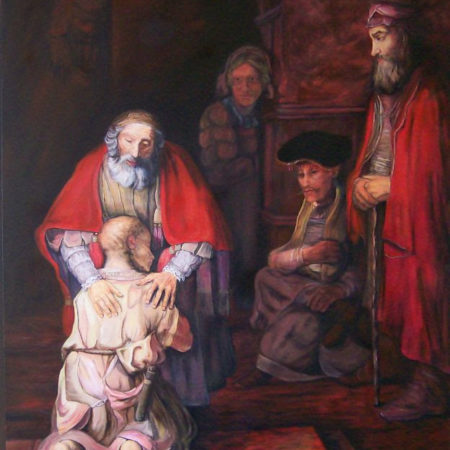Then Peter came to Jesus and asked, “Lord, how many times shall I forgive my brother or sister who sins against me? Up to seven times?”
Jesus answered, “I tell you, not seven times, but seventy-seven times.
(Matthew 18:21-22).
People tell me all the time that they take the Bible literally. But I don’t know too many of those same people who believe that Jesus literally meant we need to forgive people only 490 times and then on that 491st time we don’t have to forgive. Jesus was not telling Peter that there was a limit to forgiveness but instead he was stating the exact opposite. Forgiveness has no limits. Seven being the number of perfection or completeness. Seventy… seven times. In other words, when you get to offering forgiveness 490 times…keep on going another 490 times…and repeat.
Pastor Tim Keller wrote the book entitled Prodigal God. In the story we know as The Prodigal Son the father in the story is symbolic of God the Father. God ‘s grace, love and mercy are portrayed as “prodigal”, The word “prodigal” does not mean “wayward” but, according to Keller, … “recklessly spendthrift.” It means to spend until you have nothing left. St. Paul writes: “God was in Christ reconciling the world to himself, not counting people’s sins against them.” (2 Corinthians 5:19). God’s reckless grace is our example. He loves us “while we were yet sinners” (Romans 5:8). The father recklessly forgives the wayward son. The father loves the resentful older brother. The love was always present, it did not have to be manufactured or earned. It did not have to be bought or begged for. The forgiveness the father offers the son is manifested in his killing the fatted calf, putting the robe on his back and the ring on his finger. It is concrete and tangible. It is celebratory. It is unmerited. The son did not get what he deserved. And neither do we.
God offers us his love and forgiveness. Freely. Over and over again. 490 + times. He has no limits to his forgiveness. As he forgives us, we are to forgive others. It does not mean we have to be a doormat or that there are no consequences for people’s behaviors. Forgiving is not forgetting. Forgiveness is not condoning. Forgiveness is not allowing wrongs to persist. Forgiveness instead releases our right to revenge and anger which frees us from the bondage of fear and hate. As the great Nazarene evangelist Stephen Manley once preached….”Sometimes, you can be so right that you’re wrong.”
If our highest goal in this life is to be like Jesus, to walk in his footsteps and love the image of God in another, then we too are invited, along with Peter, to offer unlimited forgiveness. And that, we can take literally.
Shalom
What do you think? How does it make you feel?
Blessings,
Steven

